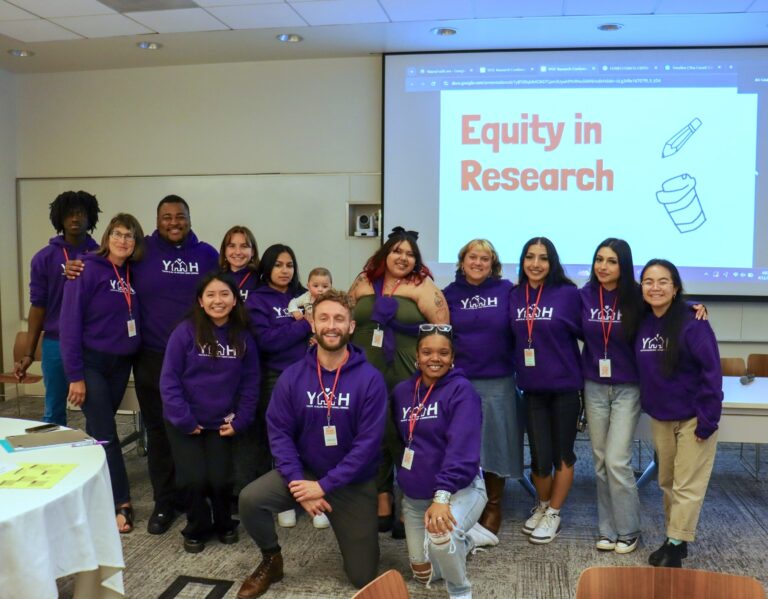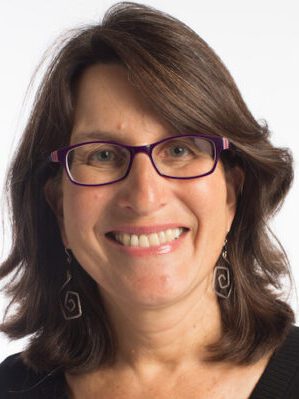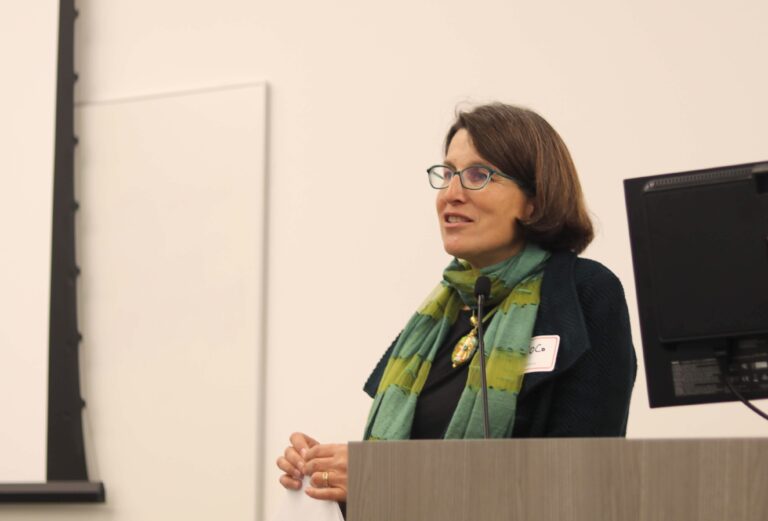To Understand Youth Experiencing Homelessness, This Professor Hires Them
Coco Auerswald has dedicated her life to working with unhoused young people. Doing research alongside them is key to learning about — and solving — youth homelessness, she says.

Eight years ago, Dr. Coco Auerswald had a bold idea for a new way to research youth homelessness. Instead of parachuting into communities to conduct interviews or distribute surveys, she thought, why not bring teens and young adults who’d experienced homelessness onto the research team itself? After all, they were the experts, she reasoned.
The effort started gradually: four interns in 2018 and three more as the first waves of COVID began, each helping to better identify the unique challenges facing young people and the innovative policies needed to help them. Encouraged by those early experiences, Auerswald’s research team in 2024 invited youth from shelters across North America to join the project, but wasn’t sure what to expect.
Over 100 young people applied. It was an overwhelming response, says Auerswald, a professor in UC Berkeley’s School of Public Health and a leading researcher in the study of homelessness.

A medical doctor, Auerswald began her career nearly 30 years ago at the height of the HIV epidemic, caring for adult patients in San Francisco. Then, she turned her attention to young people experiencing homelessness, learning from them about how their lives on the streets, in parks and couch-surfing increased their HIV risk.
Besides teaching a course at Berkeley on the root causes of homelessness, Auerswald is the co-director of Innovations for Youth, a campus research hub addressing disparities in adolescent health through collaborative research and community engagement with young people across California.
At Berkeley, she also founded Youth and Allies Against Homelessness, bringing young people affected by homelessness into the research process. The 29 paid research interns in the program have helped decide over the years which questions to ask, how to collect data, what policy proposals might entail and how to share findings.
For a 2021 survey about COVID-19’s effect on young people, their contributions yielded insights into how pandemic-related policies and response systems for youth often excluded those experiencing homelessness, while policies for people experiencing homelessness often excluded youth. Youth, in other words, fell through two sets of cracks, derailing their transitions into adulthood and increasing their poverty and food insecurity.
Last year, the team, including several Berkeley undergraduates who have experienced homelessness and its longest-serving intern, Sahra Nawabi, reviewed over 200 documents to compile a wide-ranging report, “Guidelines to Prevent, Address, and End Youth Homelessness.” Nawabi and the team’s community partners helped recruit 25 youth leaders from around the state to review the report and propose suggestions. From her experience as a youth advocate, Nawabi brought new tools, strategies and connections to help capture and represent young people’s perspectives.
“By connecting those insights to my own lived experience and research skills, I helped to ensure the research remained grounded in urgency,” Nawabi said. “I am able to transform their voices into a powerful blueprint for change.”
That perspective made the report more credible, Auerswald said.
If you’re going to make a difference, you have to have relevant questions, relevant methods, and findings that are relevant to making change.
Coco Auerswald
“When we tell people about the document and how extensive it is, they are interested,” she said. “When we tell them it has been reviewed by youth, they ask for a copy.”
This month, Larkin Street Youth Services, a San Francisco nonprofit supporting unhoused minors, honored Auerswald for her work to deepen public understanding about youth homelessness and to help shape the policies that help improve young people’s lives.
UC Berkeley News recently spoke with Auerswald about her efforts to include youth experiencing homelessness in her research and why those perspectives matter.
UC Berkeley News: You’ve long been adamant that doing research about youth homelessness must actually involve working closely with unhoused youth. Why?
Auerswald: Because if you’re going to make a difference, you have to have relevant questions, relevant methods, and findings that are relevant to making change.
In our work, young people may not come up with the questions themselves. Sometimes researchers or the larger community come up with the questions. But it should always be a question that’s relevant to young people. If young people say, “So what?” and feel like it’s not going to make a difference, then you have to go back to the drawing board, because it means you’re not actually going to do something that has traction and will make a difference.
Part of this is about these young people making research findings and recommendations, too, right?
It is so much more important to deliver that message, not just as a researcher, but with young people who are behind the work and hopefully have participated in the work. It’s going to be a lot more compelling for communities to make a change if they hear their own youth leaders advocating for that change.
That’s our goal: to help communities address the needs of their young people.

It seems reasonable that many young people experiencing homelessness would have a skepticism toward major institutions, including UC Berkeley. How does that shape how you invite them to participate?
This is a needle we’re still figuring out how to thread. And there’s not one solution.
When we first began this work, we started bringing young people into our research meetings. For a brief amount of time before COVID, we were doing it in person, and then we were doing it virtually. The important thing to us at that point was to do it at a time that worked for them, and that we were paying them — not with gift cards, but paying them with actual money, the way you and I get paid. So that was our focus.
Just like any other youth, they want an education. They want a future.
Coco Auerswald
For some young people, it worked. But there were a lot of challenges in terms of imposter syndrome, in terms of making it possible for young people to participate, and in terms of setting people up for success so that they could understand what the hell was going on around them. Undergrads have the same experience when they come here. It’s like we’re all speaking in code!
So there were definitely challenges. And with time, we got a groove going with a group of young people, some of whom stayed with us for a while. And then it became about what role they have as they have become more and more senior. Do we still just treat them like interns? Maybe they should have something more legitimate. In January, we hired Sahra, who had been an intern with us for 3½ years, as a Cal staff member in our lab.
That leads to the current structure you have, with training as part of their internship?
Now we’re doing it a little differently. We have created more formal research internships with a curriculum to orient young people. Instead of an open-ended position, they have an internship for a finite amount of time. And we actually do training in research and anchor it to a research project so that they’re giving input on that project.
We’re providing the supports — emotional, logistical, financial — so they feel they’re better able to perform and participate. And we’re being a lot more intentional about giving them specific skills and also opportunities. And if we do it right, some of them come back again for another internship and more advanced training.
What specifically have you learned by doing this type of community-engaged research with these populations that you might not otherwise have learned?
By working with young people, I realize that often the questions I’m asking are a lot more complicated than I thought they were, that I’m thinking about it in a simpler way because I’m not living their lives. And so there are a lot of nuances or other ways of looking at something that I might not have seen or thought about at all.
Doing the work this way, it just breaks down a lot of assumptions that we have about folks.
What are some of those assumptions? What do unhoused youth most want the broader public and policymakers to understand about their lives?
I think that they would really want people to understand the degree to which they’re stigmatized and what a harm that is. When I talk to them about this concept of “housism” — what I call the belief that people experiencing homelessness are less than human — their eyes light up. It gives a name to something that they experience day in and day out. It’s a huge obstacle for them.
Stigma, or housism, is an obstacle that they can’t remove. It has to be removed by their community and by society. That’s a major obstacle and a major complaint they have.
Another myth they would want to debunk is the idea that youth choose to be homeless. Is it a choice if a young person’s life circumstances are so untenable that leaving home is better than staying? They don’t want to be homeless. Just like any other youth, they want an education. They want a future. They really, really do. And they want to have a chance to learn new skills, to be heard, to be part of something larger, to be validated. And to the extent our team can help them do some of that, we’re grateful to do so and for their expertise.
This interview was lightly edited for clarity.
